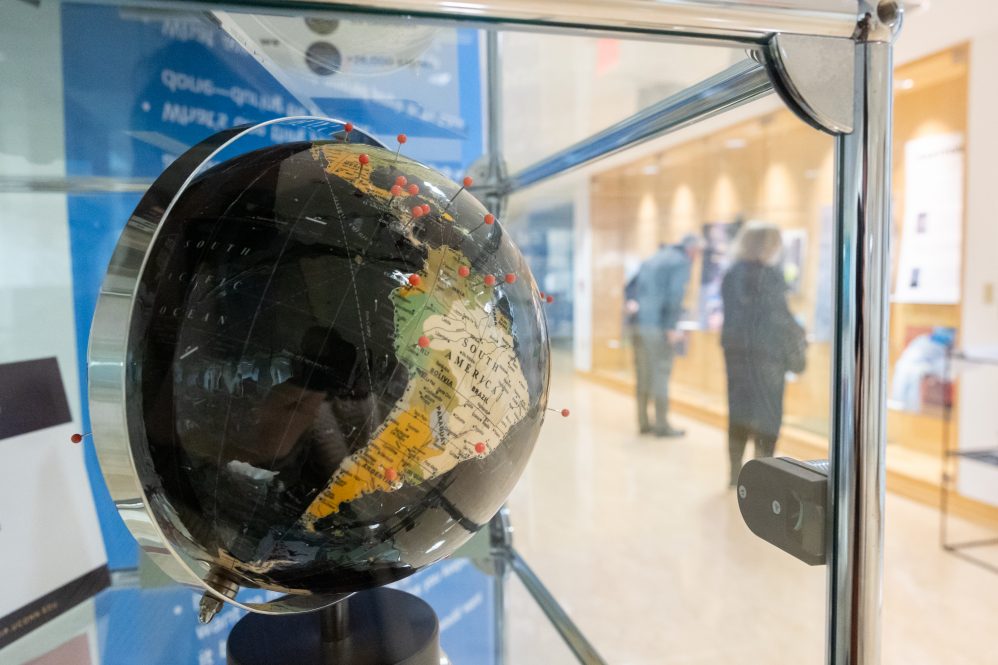Today, data from the groundbreaking Pandemic Journaling Project (PJP), headed by anthropologists Sarah S. Willen (UConn) and Katherine A. Mason (Brown University), are being made available to researchers from all disciplines. Researchers can now apply to work with the data via their forever virtual home at Syracuse University’s Qualitative Data Repository (QDR), thanks to the team’s long-term collaboration with QDR Associate Director Sebastian Karcher.
 Nearly 27,000 individual entries will now be available for researchers to consult as they seek to understand how the pandemic impacted the lives of people around the world. Each journal entry includes firsthand reflections from one of the over 1,800 participants in the study’s first phase – sometimes including digital artifacts like photos, original art, and speech recordings.
Nearly 27,000 individual entries will now be available for researchers to consult as they seek to understand how the pandemic impacted the lives of people around the world. Each journal entry includes firsthand reflections from one of the over 1,800 participants in the study’s first phase – sometimes including digital artifacts like photos, original art, and speech recordings.
“Each journal, and each person’s story, matters on its own terms,” says Willen, who also co-directs the Research Program on Global Health and Human Rights at the Gladstein Family Human Rights Institute. “Taken together, this collection of materials offers a unique and extraordinary window onto how the pandemic challenged us and changed us, not just as individuals but also as members of broader communities.”
Willen is excited about both the short-term and long-term possibilities for the data. Already, the PJP research team has begun using PJP data to explore a wide variety of questions, ranging from the impact of the pandemic on different groups’ mental health, to students’ experiences during COVID-19 around the globe, to the human rights dimensions of the project itself, which the team describes as a form of “archival activism.”
But the project’s full significance as a pandemic time capsule may not become clear until twenty, forty, or even a hundred years from now, Willen says – especially after the COVID-19 pandemic has faded from living memory.
“Our hope is that one day people with no personal memory of the pandemic will dig into the archive and find voices of real people – either by reading their journal entries, or literally hearing their voices – and that those encounters will illuminate the incredible fear, pain, and loss – and sometimes solidarity, joy, and relief – people around the world found themselves feeling,” Willen says.
In addition to recording journal entries, PJP participants also reported on how their physical and mental health, as well as their level of trust in government and social institutions, changed throughout the pandemic. The data collection began extraordinarily early – on May 29, 2020, less than 80 days after the WHO declared the pandemic.
It’s one thing to read newspaper accounts … but it’s something very different to hear people talk about the extraordinary loneliness that they’re experiencing because they haven’t used their voice in 36 hours.
“We knew from the very beginning that we wanted to share these data widely and archive them for the future,” says Mason. “We were so lucky to be able to connect with Sebastian and his [QDR] team early in the process so that we could make sure that we were able to do so as ethically and effectively as possible.”
The resulting collection is unique in its breadth and potential for use and re-use by researchers in anthropology, sociology, history, and public health, among other fields.
“There are several large quantitative surveys in the social sciences that are broadly used,” says Karcher, “but qualitative datasets that are large enough to be analyzed from so many different angles are very, very rare. The PJP data are going to be a treasure for social scientists for years to come, and we at QDR couldn’t be more excited to be the permanent home for them.”
To protect participants, access to the full PJP data on QDR requires prior approval—requests can be submitted directly from the dataset’s page on QDR. However, a significant subset of more than 2,000 entries are already available for searching and browsing on the Featured Entries page of the PJP website. There, anyone can spend time with the multiplicity of recorded stories.
The team believes the firsthand, qualitative nature of the data can play a crucial role in conveying the true human costs of the pandemic to future generations.
“It’s one thing to read newspaper accounts or policy documents from a particular moment in time, but it’s something very different to hear people talk about the extraordinary loneliness that they’re experiencing because they haven’t used their voice in 36 hours,” Willen says. “Or about the incredible sense of loss you feel when milestones arrive –birthdays, the birth of a new baby, a funeral – and you can’t be together with loved ones. Without first-person accounts about moments like these, it’s extremely difficult to understand or communicate the experience of living through a massive global crisis.”
Learn more about the Pandemic Journaling Project in the Spring 2024 issue of UConn Magazine.



